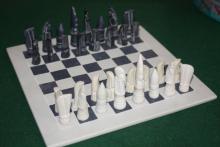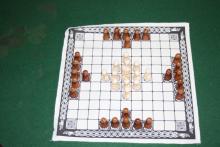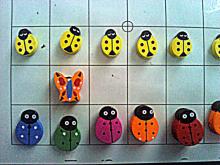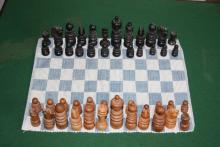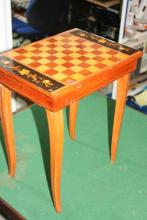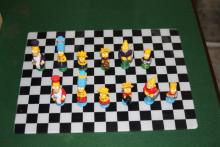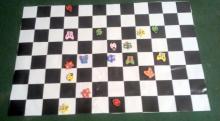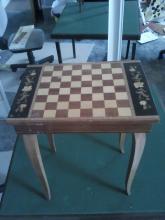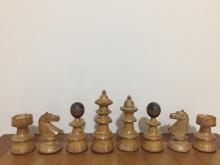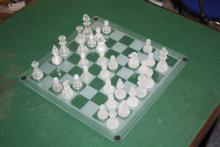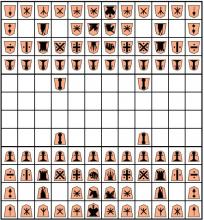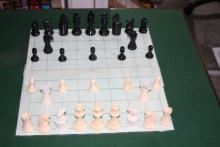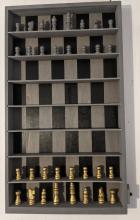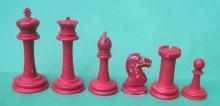Our esteemed colleague Dan Frean asked me recently about teaching
chess in Maths lessons. In the spirit of BBC's Any Answers, I
don't think ignorance should be any barrier to trumpeting my
ideas... I'll just dump the e-mail here, and add the links and
the examples in later when I've got a bit more time.
I'm anxious not to use chess in a way that emphasises existing
differences
in chess ability...
My all-purpose lesson plan for everything below is "1. Examine what
you
have been given 2. Tackle the task 3. Review progress 4. Plenary" with
objective "Practise and reflect on problem-solving skills".
In my mind, there is a general problem-solving process of (a) throwing
up ideas and (b) seeing if any of them work, and if not, can we learn
anything from the attempt. There's also a distinction between problems
that can be solved by analysis (tactics), or brute force (traditional
problems) and those that require more general, abstract considerations.
And there are easy, one- step problems, deep problems that require
several elements to be brought into play (perhaps in a particular
order)
and other problems where logic needs to be combined with some essential
insight. All of these problems can be offered raw, with hints or as
multiple choice; some require you to question your assumptions. Not
sure
I could call to mind right now an example of a problem or situation
which could cater for each of those different combinations, but I bet I
could find one.
I'm sure your existing repertoire of group puzzle-solving or mini-games
is more than adequate -- mini-games are things like hexapawn, or
similar
variants? And you've seen the repertoire of piece-specific
puzzles,
like the Knight's Tour? [LINK] But here is a scatter of other
ideas:
I have some favourite chess puzzles, which I enclose, not all of which
need a lot of chess insight. I always find puzzles with a joke in them
appealing (to me and to youngsters): I have one where I tell them, it's
mate in six, and if you can't solve this, I'm going to have you thrown
out of the club! -- which is of course a sequence of forced moves for
both players. I think the payoff for having fun with these is if the
pupils can reflect afterwards about their puzzle-solving skills, and if
any of them are more general problem-solving skills that they can use
elsewhere. So, you can follow the jokey #6 with a similar mate-in-six
where they have to lose a move (so, timing is important, and the direct
route does not always bring success). [ENCLOSED]
I have one or two exercises intended to flex particular chess muscles
which you might try [LINK: GetEyeIn]
Irving Chernev's Practical Chess
Endings is actually a series of
contrived endgame studies, and the simple ones at the start show some
graded difficulty which does not rely on chess ability. I'm sure
everyone could tick off the first few, your best in the class might
tackle the Saavedra or Lasker positions. [ENCLOSED]
As for proper chess, I've enjoyed using the Icelandic Endgame Medal
Series; when you know how to
solve a problem, you have to play it out
against resistance by me (or someone who is on the next level).
You may know, and are welcome to borrow, Coakley's books: the blue one
has an excellent series of questions to ask a class that aren't about
pawn-takes-bishop, such as How many
minor pieces does it take to
attack every square on a file?
You may know the Professor Chess
materials, of which there is a free
sample enclosed. Spotting attacks is half the art...
There are some construction tasks: create a position which has as many
examples of X as you can, the most gets a prize (most forks for one
side, most pins for both sides, most mates, most checks)... Create a
game which is the fastest mate, the fastest to reach 2 bare Kings, the
fastest stalemate... [some examples ENCLOSED]
Stephen Addison once wrote a book, "100
games to play on a chessboard".
The general, abstract and strategic thinking can of course be applied
at
the chess board but it always seems to me to be a nice approach to
teach
a chess variant -- first check chess, Kriegspiel, losing chess, Monster
chess, the Maharahah and the Sikhs, and so on. [The idea of using
unfamiliar games is to get reduce the salience of their existing chess
ability.] Having heard the rules, the class might suggest some
strategies for play, can try those strategies, and report back about
what worked well or not so well, and think about if they could have
worked any of the conclusions out from that out at the start. Some of
the games can be solved (first check chess is a forced win for the
first
player, the Maharajah can be captured by the Sikhs) some can be solved
for certain conditions (1.e4 is a forced loss in losing chess) some you
can change your normal chess strategy and hope to survive and even
thrive (Kriegspiel) and some are intractable. Shatranj is a game which
has its own collection of pre-worked starting positions and a huge
variety of puzzles; do you know Dilaram's Problem? [LINK] The class
might also enjoy working out the basic strategy of Go (I think a class
could come up with the "two-eyed immortal group" idea.)
Do you know Detective Chess? [Identify positions of KQRNB which may be
on squares d8 e1 f3 h4 or h8 by knowing the number of attacks made on
selected squares: c1 is attacked once, d7=1, d6=0, f2=2, h7=2]. That's
a
nice exercise in logic, not requiring chess ability, and lends itself
to
strategic thinking. [ENCLOSED]
And my youngsters like Alex Bartashnikov's sequence training game
called
Alter Way [using Qd8, capture enemy pieces on a4 a8 c8 f3 f8 in no more
than 5 moves]. [ENCLOSED]
And I hope you have met Raymond Smullyan's fantastic retro puzzles: a
couple of easy ones enclosed, one in the PGN file and the other as a
PDF. Exercises not in chess but in logic, good for questioning
assumptions, making deductions, looking for evidence...








